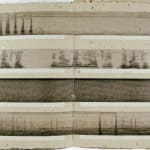Thomas Grill, Almut Schilling, and Till Bovermann (eds.)
Rotting Sounds, 2025
Vienna: Mark Pezinger Books
One of twenty copies.
1663
Further images
-
(View a larger image of thumbnail 1
)

-
(View a larger image of thumbnail 2
)

-
(View a larger image of thumbnail 3
)

-
(View a larger image of thumbnail 4
)

-
(View a larger image of thumbnail 5
)

-
(View a larger image of thumbnail 6
)

-
(View a larger image of thumbnail 7
)

-
(View a larger image of thumbnail 8
)

Quarto. 31pp. An investigation of the material realities, and costs, of digital media and its deterioration, Rotting Sounds is made from paper pulped from the residue collected during its research:...
Quarto. 31pp. An investigation of the material realities, and costs, of digital media and its deterioration, Rotting Sounds is made from paper pulped from the residue collected during its research: yogurt cups, spray cans, hard disks, USB sticks, cables, and clothing. The result is a highly textural object, designed to bring physical awareness to virtual data. The environmental impact, though less visible, is no less urgent; computing, including artificial intelligence, consumes massive amounts of energy and can result in waste difficult to properly recycle or discard. Of equal urgency are questions of collection and preservation. The authors, in their respective essays, address the inevitable deterioration of all digital media, particularly sound recordings. These are represented in visualizations of sound patterns drawn from audio sources; the ends of the bands inevitably blur, revealing its instability. The authors quickly and incisively point out that we are all too quick to assume the durability of digital media, but its decay is certain. Equally certain is the structural impact of data storage, both virtual and physical, as the contemporary engine of industrialization, which always favors those in power. As the book's concluding essay observes, those who can afford preservation will write, and store, history: "The future allocation of resources for the preservation of cultural and social phenomena that are (currently still) represented or stored in audio and visual formats has highly political implications." A carefully researched and provocatively presented work. Bound in self-wrappers. Fine.











